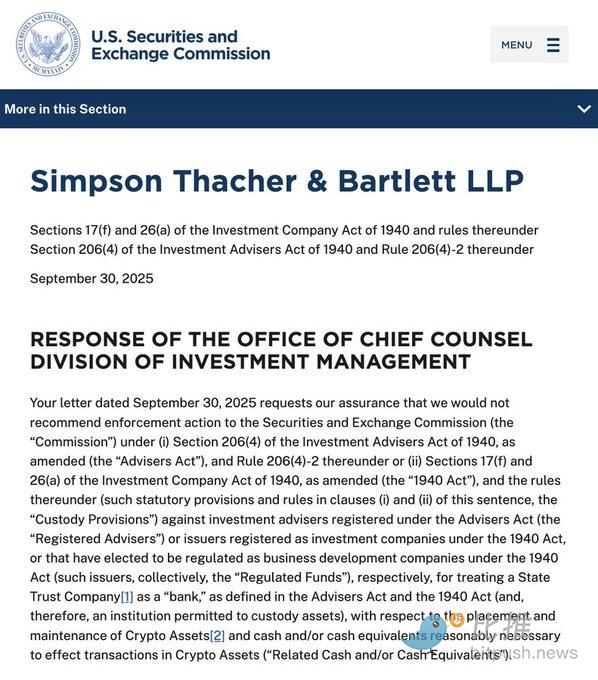Author: Bitpush
On October 1, Beijing time, the U.S. Securities and Exchange Commission (SEC) delivered a "Golden Week gift" to the crypto market. The agency's investment management division issued a significant No-Action Letter, officially confirming:
Registered Advisers and regulated funds can custody crypto assets with state-chartered trust companies, and the SEC will not take enforcement action against this.
This letter means that the long-standing regulatory gray area regarding "qualified custodian status" has finally been clarified—state trust companies can be regarded as "banks" in a legal sense, thus obtaining the status to legally custody crypto assets such as Bitcoin and Ethereum.
In other words, since the controversy over "custody rules" during former Chairman Gary Gensler's tenure, the "qualified custodian" dilemma that has troubled Wall Street for years has been resolved, and the last barrier for institutional funds to enter the crypto market has finally been opened.

Background: Five Years of Evolution from "Ban" to "Open"
In recent years, U.S. federal regulatory agencies—including the Federal Reserve, the Office of the Comptroller of the Currency (OCC), and the Treasury Department—have strictly limited regulated financial institutions from providing services to crypto companies through the so-called "Operation Choke Point 2.0." The SEC once viewed crypto custody as posing "systemic risks" and attempted to introduce new regulations requiring investment advisers to only custody crypto assets with "traditional bank-level" institutions.
This approach was widely seen as a way to undermine institutions like Coinbase and Kraken that hold state trust licenses. However, with the Trump administration's rise in 2025 and the SEC's current Chairman Paul Atkins promoting the "Project Crypto" policy plan, the SEC's stance is rapidly shifting—from blocking to accepting, from observing to building.
Core Content: State Trust Companies = Formal Recognition of "Bank Status"
According to SEC official documents, if investment advisers or funds wish to use state trust companies as custodians for crypto assets, they must meet four major conditions:
Annual Due Diligence
Advisers must ensure that the trust company:Is authorized by the state banking regulatory authority;
Has a complete internal control mechanism to prevent theft, misuse, and private key leakage;
Provides independently audited financial statements and SOC-1/SOC-2 internal control reports.
Sign a Written Custodial Agreement
The custodian company may not lend, pledge, or re-pledge crypto assets without the client's written consent, and the custodied assets must be segregated from the company's own assets.Risk Disclosure
Advisers must fully disclose to clients or the fund's board the potential risks of using state trust companies to custody crypto assets.Best Interest Test
Advisers or the fund's board must reasonably determine that the custodial arrangement is in the best interest of clients or shareholders.
These conditions ensure the three bottom lines of compliance, transparency, and investor protection.
Industry Reaction: The "Regulatory Dawn" for Crypto
This letter is seen by the industry as a "milestone in the clarification of digital asset regulation."
Bloomberg Intelligence analyst James Seyffart commented:
"This is a textbook example of regulatory clarity that the digital asset space has long awaited—exactly the change the industry has been calling for over the years."

U.S. Senator Cynthia Lummis from Wyoming also expressed on X:
"I am pleased to see the SEC finally recognize state-chartered trust companies as qualified digital asset custodians. Wyoming was the first to achieve this breakthrough back in 2020, and now the SEC has finally acknowledged the rigor and value of the state-level regulatory system."
Currently, several well-known crypto companies—such as Coinbase Trust, Kraken Trust, and Anchorage Digital Bank—are operating under the state trust license system. This policy legitimizes these institutions, theoretically allowing them to provide custody services legally to investment advisers, funds, and institutional clients.
Internal "Route Dispute" within the SEC
Although this is a significant victory for crypto custody, there is not unanimous support within the SEC.
Republican Commissioner Hester Peirce (long known as "Crypto Mom") pointed out in a speech in Singapore: "The SEC should update custody rules to allow technically capable institutions to qualify for self-custody of digital assets, rather than excluding them."
In contrast, Democratic Commissioner Caroline Crenshaw strongly opposed this no-action treatment, arguing that it amounts to: "Putting investors in a regulatory roulette of 50 state regulatory systems. Pushing such a significant change with a letter, without public consultation and economic analysis, is irresponsible."
Impact and Outlook: The "Green Light" for Institutional Custody of Crypto Assets
The practical significance of this no-action letter goes far beyond being a compliance "comfort letter." It marks the first formal recognition of a legal and compliant path for crypto custody by the U.S. regulatory system and may lead to the following impacts:
Accelerate institutional fund entry. Investment advisers and funds can now legally custody Bitcoin, Ethereum, and other assets, clearing legal obstacles for institutional allocation of digital assets.
Strengthen the status of the state trust system. State trust companies (such as those in Wyoming, New York, and Texas) will become important pillars of crypto financial infrastructure.
Promote the institutional development of the crypto asset market. Following ETFs, "custody legalization" is another key piece for institutional investors to participate in the crypto market.
Pave the way for future legislation. Although this letter is not formal law, it provides a realistic basis for Congress to pass legislation such as the Digital Asset Market Structure Act.
In summary, as state trust companies gain the same custodial status as banks, the last concerns of traditional funds regarding allocating Bitcoin and Ethereum have been eliminated, and a new institutional era is accelerating its arrival.
免责声明:本文章仅代表作者个人观点,不代表本平台的立场和观点。本文章仅供信息分享,不构成对任何人的任何投资建议。用户与作者之间的任何争议,与本平台无关。如网页中刊载的文章或图片涉及侵权,请提供相关的权利证明和身份证明发送邮件到support@aicoin.com,本平台相关工作人员将会进行核查。




